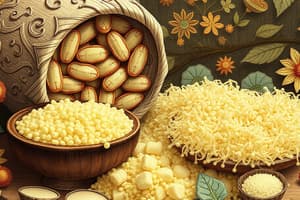Podcast
Questions and Answers
What is the primary basis for classifying carbohydrates?
What is the primary basis for classifying carbohydrates?
- Number of sugar units (monomers) (correct)
- Type of functional group
- Amount of energy provided
- Presence of vitamins
Which of the following is NOT a role of carbohydrates in metabolic processes?
Which of the following is NOT a role of carbohydrates in metabolic processes?
- Maintaining blood sugar levels
- Serving as building blocks for proteins (correct)
- Providing energy
- Being a source of fiber
Which carbohydrate is often associated with sweet fruits and honey?
Which carbohydrate is often associated with sweet fruits and honey?
- Cellulose
- Fructose (correct)
- Lactose
- Starch
What is a notable characteristic of dextrose in relation to carbohydrates?
What is a notable characteristic of dextrose in relation to carbohydrates?
Why are carbohydrates essential in daily nutrition?
Why are carbohydrates essential in daily nutrition?
Flashcards
Carbohydrate Classification
Carbohydrate Classification
Carbohydrates are categorized based on the number of sugar units (monomers) they contain.
Monomer
Monomer
A single sugar unit.
Carbohydrate Function
Carbohydrate Function
Carbohydrates provide energy and play roles in metabolic processes.
Energy Provided by Carbohydrates (Factor)
Energy Provided by Carbohydrates (Factor)
Signup and view all the flashcards
Examples of Carbohydrates
Examples of Carbohydrates
Signup and view all the flashcards
Blood Sugar
Blood Sugar
Signup and view all the flashcards
Study Notes
Carbohydrates
- Carbohydrates are a crucial part of the daily human diet.
- In common terms, carbohydrates are called "sugar." Sucrose, or table sugar, is one common example.
- Carbohydrates are classified based on the number of sugar units ("monomers") they contain.
- Objectives for learning about carbohydrates include:
- Classifying different carbohydrate types.
- Understanding the role of carbohydrates in metabolic processes.
- Knowing the significance of carbohydrates for daily life and nutrition.
Classification of Carbohydrates
- Carbohydrates are categorized based on the number of monomers.
- Classification is not based on energy provided, functional groups, or energy content.
Simple Carbohydrates
- Provide quick energy.
- Break down quickly.
- Often lack other nutrients and fiber
- Examples include sugar in various forms (table sugar, candy, etc.), and some fruits.
Complex Carbohydrates
- Provide lasting energy.
- Break down slowly.
- Rich in vitamins, minerals, and fiber.
- Examples include beans, oats, grains, potatoes.
Aldose and Ketose Sugars
- Aldose sugars have an aldehyde group.
- Ketose sugars have a keto group.
- Both contain hydroxyl groups.
- Examples include glyceraldehyde and dihydroxyacetone.
Number of Monomer- Monosaccharides
- Glucose: blood sugar, dextrose
- Galactose: Milk products
- Fructose: Fruits & honey
Number of Monomer- Disaccharides
- Maltose: Glucose + Glucose, found in malt
- Sucrose: Glucose + Fructose, found in table sugar, sugarcane, sugar beet.
- Lactose: Glucose + Galactose, found in milk and milk products
Number of Monomer- Polysaccharides
- Polysaccharides consist of hundreds or thousands of monosaccharides joined together.
- Polysaccharides provide energy storage (glycogen and starch).
- Polysaccharides also provide structure (cellulose and chitin).
Studying That Suits You
Use AI to generate personalized quizzes and flashcards to suit your learning preferences.
Related Documents
Description
This quiz explores the essential role of carbohydrates in the human diet, focusing on their classification, types, and significance in nutrition. You'll learn about simple and complex carbohydrates, their energy contributions, and their impact on daily life. Test your knowledge of carbohydrates and enhance your understanding of nutrition!




